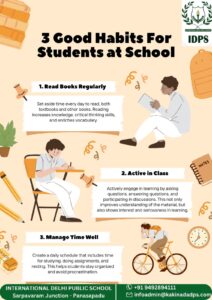What is Inclusive Education?
Inclusive education is a holistic approach that integrates all students—regardless of abilities or challenges—into the same classrooms, curriculum, and school culture. It emphasizes:
- Equal learning opportunities
- Personalized teaching methods
- Respect for diversity
- Removing barriers to participation and achievement
Why Inclusive Education Matters at DPS Kakinada?
At DPS Kakinada, inclusivity is more than a policy—it is a value. The school understands that:
- Every child learns differently
- Equal access builds confidence and social awareness
- Inclusion prepares students for real-world collaboration
By focusing on inclusive strategies, the school not only promotes fairness but also encourages a stronger sense of community and empathy among students.
How DPS Kakinada Implements Inclusive Education?
1. Differentiated Instruction
Teachers use multiple teaching techniques—visual, auditory, kinesthetic—to address diverse learning styles and abilities.
2. Personalized Learning Plans
Students who need special attention are given Individualized Education Plans (IEPs), designed in consultation with parents, counselors, and educators.
3. Trained Special Educators & Counselors
DPS Kakinada employs certified special educators, therapists, and counselors to work alongside classroom teachers in supporting students with learning or emotional needs.
4. Collaborative Learning Environment
Group activities, buddy systems, and team projects ensure that students with varying abilities work and grow together.
5. Assistive Technology & Tools
The school provides smart classrooms, visual aids, learning apps, and devices that cater to children with specific learning challenges or disabilities.
Key Features of Inclusive Education at DPS Kakinada
Specialized Faculty : Trained educators support academic, emotional, and behavioral needs
Peer Support Programs : Students are paired as learning buddies to promote mutual learning
Accessible Curriculum : Study materials adapted to match different learning levels and languages
Regular Assessments : Student progress is monitored using flexible evaluation methods
Inclusive Extracurriculars : Sports, arts, and leadership opportunities designed for all ability levels
Benefits of Inclusive Education at DPS Kakinada
For Students with Special Needs:
- Access to high-quality education in mainstream settings
- Greater confidence and self-esteem
- Better social and communication skills
- Equal opportunities for participation
For All Learners:
- Development of empathy, patience, and teamwork
- Exposure to diversity enhances critical thinking
- Builds inclusive values from a young age
For Educators:
- Professional growth through training and collaboration
- Ability to innovate in teaching and classroom management
- Stronger relationships with students and parents
Real-Life Inclusive Activities at DPS Kakinada
- Inclusive Sports Days where all students participate regardless of ability
- Life Skills Workshops on empathy, diversity, and resilience
- Celebrations of World Autism Awareness Day & International Day of Persons with Disabilities
- Art and Drama Therapy Programs open to everyone
Conclusion
Delhi Public School, Kakinada, has taken commendable strides in creating an inclusive educational space that nurtures growth, diversity, and equality. Through the integration of specialized programs, a skilled support system, and inclusive values, DPS is setting an example for other institution.
Frequently Asked Questions
1. What is inclusive education at DPS Kakinada?
Inclusive education at DPS Kakinada means providing a supportive and equitable learning environment where students of all abilities, backgrounds, and learning needs are welcomed and educated together.
2. What steps has DPS Kakinada taken to implement inclusive education?
DPS Kakinada has adopted several steps to support inclusion, including:
Special educators and counselors on staff
Individualized Education Plans (IEPs)
Sensitization programs for teachers and students
Barrier-free infrastructure for students with disabilities
Training workshops for inclusive teaching strategies
3.Can parents be involved in the inclusive education process?
Absolutely. DPS Kakinada values parental involvement and encourages regular meetings, feedback sessions, and collaboration in developing and reviewing IEPs.








